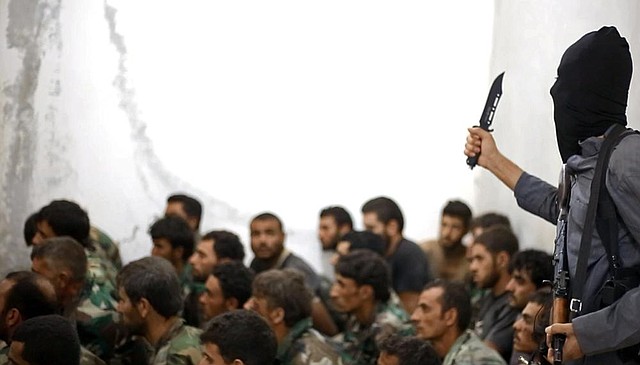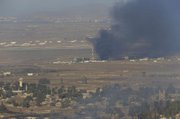U.N.: Syrian civilians target of war crimes
An Islamic State fighter brandishes a knife in front of captured Syrian soldiers after the rebels captured Tabqa air base in Raqqa, Syria, in this undated photograph.
Thursday, August 28, 2014
BEIRUT -- The Syrian government has likely used chlorine gas to attack civilians while the Islamic State group fighting it has committed crimes against humanity with attacks on civilians in two provinces, an independent United Nations commission said Wednesday.
RELATED ARTICLES
http://www.arkansas…">Can't talk yet of Syria captivity, journalist sayshttp://www.arkansas…">U.S. looking at aid mission to Iraq Turkmens
Also Wednesday, the mother of an American journalist held captive in Syria pleaded for his release in a video directed at the Islamic State, and new images emerged of mass killings, including masked militants shooting kneeling men after the capture of a strategic air base in Syria.
The U.N. commission report, which is investigating potential war crimes in Syria, said Wednesday that the Syrian government of President Bashar Assad likely used chlorine gas to attack civilians.
It was the first time the U.N. assigned blame for the use of the chemical agent in the Syrian war.
The report cited victims and medical workers who described symptoms caused by exposure to chemicals, and witnesses who reported chlorinelike smells immediately after government helicopters dropped explosive-filled canisters in the provinces of Idlib and Hama eight times from April 11-29.
Chlorine is not banned under the chemical-weapons convention, but the use of any toxic material as a weapon is illegal under international law.
In another development Wednesday, a monitoring group said cluster bombs, outlawed munitions that kill and maim indiscriminately, have caused more casualties in the Syrian civil war than in the 2006 Lebanon conflict, when Israel's heavy use of the weapons hastened the treaty banning them two years later.
Cluster bombs contain hundreds of small explosive munitions, or bomblets, usually dropped from aircraft or fired by artillery. They are engineered to explode in midair and scatter the bomblets over a vast area, not distinguishing between military and civilian targets. Many of the bomblets fail to explode and can lie dormant for decades.
The group, the Cluster Munition Coalition, said in an annual report that it had documented at least 264 deaths and 1,320 injuries in Syria from cluster bombs used in 2012 and 2013, and that "hundreds more were recorded in the first half of 2014."
Civilians made up 97 percent of the dead in Syria, the report said, and the number of such injuries doubled in 2013 from the year before, suggesting that the weapons had been increasingly deployed in more heavily populated areas.
Although the report did not specify whether government forces or insurgents were using them, munitions experts have said that only the Syrian military has the technical capability.
The U.N. commission also said Wednesday that the Islamic State extremist group had committed crimes against humanity in Syria. It had previously accused the group of similar crimes in Iraq.
"This is a continuation -- and a geographic expansion -- of the widespread and systematic attack on the civilian population" by the Islamic State group, said the four-member commission led by Brazilian diplomat Paulo Sergio Pinheiro.
Pinheiro said one of the most disturbing findings was the existence of large training camps where boys, some as young as 14, are recruited and trained to fight alongside adult Islamic State fighters.
The report, based on 480 interviews and documentary material, cited dozens of public executions in Aleppo and Raqqa during the bloody Syrian civil war that activists say has killed more than 190,000 people since 2011.
The report cited how the group's fighters have beheaded or shot civilians, mostly adult men, accused of violating their harsh interpretation of religious law, as crowds of people, including children, have looked on. The purpose, according to the commission, is "to instill terror among the population, ensuring submission to its authority."
"The overall scale of the violations continues to increase regardless of the parties perpetrating them," Pinheiro said at a news conference in Geneva, where he voiced frustration at the paralysis on Syria in the U.N. Security Council. "This paralysis is responsible for acute harm to victims of this war."
Appeal to Captors
The Islamic State last week released a video showing the beheading of American journalist James Foley. The militants also have threatened to kill 31-year-old American journalist Steven Sotloff unless the U.S. halts airstrikes against the group in Iraq.
Sotloff, who freelanced for Time and Foreign Policy magazines, had last been seen in Syria in August 2013 until he appeared in the video released online last week.
On Wednesday, Sotloff's mother released her own video, pleading for her son's release. Shirley Sotloff said her son was "an innocent journalist" who shouldn't pay for U.S. government actions in the Middle East over which he has no control.
Appealing directly to Islamic State leader Abu Bakr al-Baghdadi, who describes himself as a caliph, or Islamic leader intending to lead the Muslim world, she implored him to show mercy and follow the example of the Prophet Muhammad.
"You, the caliph, can grant amnesty," Shirley Sotloff said on the video, which was first aired on the Al-Arabiya television network. "I ask you, please, to release my child. I ask you to use your authority to spare his life."
Al-Baghdadi, an Iraqi who was jailed briefly by U.S. forces in 2004, declared a caliphate, or state ruled by Islamic law, this year in territory his group captured in Iraq and Syria. His claim to authority has not been recognized by the wider Muslim world.
The video was widely reposted on the Internet by Islamic State supporters later Wednesday with her face blurred. The group's ultraconservative interpretation of Islam prohibits showing a woman's face.
At the White House, spokesman Josh Earnest said he did not know whether President Barack Obama had seen Shirley Sotloff's video appeal, but he said the administration was "deeply engaged" in trying to gain release of all Americans held hostage in the Middle East.
"She obviously, as is evident from the video, feels desperate about the safety and well-being of her son, and understandably so, and that is why our thoughts and prayers are with Mr. Sotloff's family at this very difficult and trying time," Earnest said.
Several U.S. officials, including U.S. Rep. Ileana Ros-Lehtinen, R-Fla., said they have been working behind the scenes to find out more about Steven Sotloff and try to secure his release.
"This is a tragic situation and we have seen that [the Islamic State] has no respect for human life," Ros-Lehtinen said.
Meanwhile, new images emerged of the extremists' bloody takeover of an air base in northeastern Syria.
In one photo posted online, masked gunmen were seen shooting seven men kneeling on the ground, some dressed in what appeared to be Syrian military uniforms, after the seizure of the Tabqa air base in the province of Raqqa earlier this week.
Some photos showed captured Syrian soldiers, many with bloodied and swollen faces. In one, a masked Islamic State fighter stood behind a group of soldiers brandishing a knife of the type the militants have used is the past to behead victims, including Foley. In another, a militant grinned as he pressed a double-edged sword against the neck of a captured soldier inside a jeep.
Videos uploaded to social media networks also showed the aftermath of the battle, including footage of the charred bodies of Syrian soldiers. One video showed about 200 captured soldiers being marched through the desert in their underwear to an unknown fate as militants made the sounds of shepherds herding goats or sheep.
The 36 photos and video images corresponded with reports of the Islamic State militants' seizure Sunday of the air base, which had been the last government-held outpost in Raqqa, a province now dominated by the jihadist group. Militants also captured the base's weaponry, including artillery and mounted machine guns.
Golan Crossing Seized
In Syria on Wednesday, rebels seized control of a frontier crossing with Israel in the Golan Heights on Wednesday after heavy clashes with Assad's forces, activists and rebels said.
The capture of the post along Syria's border in the Golan held more symbolic value than strategic, but rebels said it would provide relief to nearby villages that were under siege by government troops.
The Britain-based Syrian Observatory for Human Rights said an array of rebel fighters, including from the al-Qaida-linked Nusra Front and the Western-backed Free Syrian Army, took the crossing after heavy fighting that left at least 20 Syrian soldiers and an unknown number of rebels dead.
It said clashes also raged in the towns of Jaba, Tal Kroum and Rawadi in Quneitra province.
Gen. Ibrahim Jbawi, the spokesman for the Free Syrian Army's southern front, confirmed the rebel gains. He said Syrian forces still control another crossing nearby, typically used to search products entering from the Israeli-controlled Golan Heights into Syria -- usually crates of apples.
Kenan Mohammed, a spokesman for the Western-backed Syrian opposition, said rebels aimed to push Assad's troops from all of Quneitra. He also said opposition forces posed no threat to Israel.
"Our aim isn't Israel right now, and we in the FSA haven't targeted Israeli lands," he said, adding that the rebels' focus is on Assad and the extremist Islamic State group. "The matter of Israel -- it's not for now, and it's more political."
He denied there had been any collusion with Israel about seizing the border crossing.
The fighting on the Syrian side of the Golan frontier spilled over into Israel, with errant fire wounding an army officer, Israel's military said. It did not immediately comment on the crossing takeover.
Information for this article was contributed by Diaa Hadid, John Heilprin, Curt Anderson, Ryan Lucas and Zeina Karam of The Associated Press and by Rick Gladstone, Rukmini Callimachi and Nick Cumming-Bruce of The New York Times.
A Section on 08/28/2014


